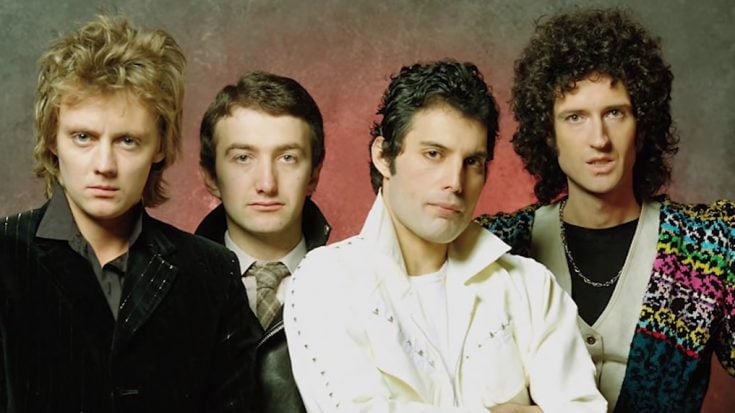Classic Rock Artists That Never Won A Grammy

via MusiXion - All Things Music / YouTube
Forget the glitz and the gowns, the red carpets, and the red envelopes. For many rock legends, the Grammys have been more like a hall of shame than a career highlight. Sure, the awards ceremony might be “music’s biggest night”, but what does that title really mean when it blatantly overlooks some of the most influential artists in history?
This isn’t some conspiracy theory, it’s a reality check. We’re talking Rock & Roll Hall of Famers, platinum-selling titans, true icons – all snubbed by the Recording Academy.
Queen? Grateful Dead? ZZ Top? KISS? Believe it or not, these giants and countless others haven’t nabbed a single Grammy. Think Sir Mix-A-Lot or Hootie & the Blowfish have more staying power? We think not.
So, what does this tell us? That awards shows, with all their glitz, can be pretty poor indicators of an artist’s true impact. The music lives on, the legends endure, Grammy or no Grammy. Join us as we explore this surprising list and celebrate the rock heroes who stand tall, trophies or not.
Queen
Queen, despite their undeniable influence and rock legend status, never held a Grammy Award in their hands. Tracks like “Bohemian Rhapsody” (nominated in 1976) and “Another One Bites the Dust” (nominated in 1980) were overlooked, leaving many fans scratching their heads. While the band received a Lifetime Achievement Award in 2018, their trophy case remains surprisingly empty.
But does this lack of recognition diminish their impact? Absolutely not. Queen’s music transcends awards. With over 300 million albums sold, anthems like “We Are the Champions” and “Don’t Stop Me Now” echo across generations. Their theatrical live shows, Freddie Mercury’s captivating vocals, and Brian May’s innovative guitar work redefined rock, inspiring countless artists.
So, while Queen may not have Grammys, their legacy lives on. Their induction into the Rock & Roll Hall of Fame and countless accolades solidify their place as rock royalty. Their music continues to move millions, proving that true artistic impact lies far beyond the reach of any award ceremony.
The Who
The Who—the iconic British rock outfit hailed as one of the most influential and critically acclaimed rock bands of all time—surprisingly hold no competitive Grammy Awards. While Roger Daltrey and Pete Townshend were eventually honored with a Lifetime Achievement Award in 2001 and the band received the Kennedy Center Honors in 2008, iconic albums like “Tommy” and “Who’s Next” never received their due recognition at the Grammys.
This lack of wins is particularly surprising considering the band’s impact. They’ve sold over 100 million albums worldwide, boasting anthems like “Baba O’Riley”, “Won’t Get Fooled Again”, and “Pinball Wizard” that continue to resonate across generations. Their innovative rock operas and powerful live performances pushed rock boundaries, inspiring countless artists from punk to metal.
So why? Award show politics and genre biases could be contributing factors. The Who’s peak commercial success often coincided with the rise of disco, a genre that dominated the Grammys in the late 70s. Additionally, the band’s rebellious and experimental spirit might not have always aligned with the Recording Academy’s tastes.
The Kinks
Another major nomination snub were the progenitors of the punk ethos, The Kinks. These pioneers of the British Invasion helped ignite the ’60s rock scene with hits like “You Really Got Me” and “Waterloo Sunset”, then evolved into critically acclaimed album-rock giants with masterpieces like Arthur and Lola Versus Powerman.
The later years saw them morph into powerful arena rockers with anthems like “Come Dancing.” Despite this remarkable journey and lasting influence, the Kinks have never even received a Grammy nomination.
Their exclusion is particularly baffling considering their impact. Beyond chart-topping hits, the Kinks’ influence stretches far and wide. Artists like Blur, Oasis, and Green Day cite them as inspiration, and their blending of diverse influences – from British music hall to American blues – paved the way for countless acts. Their songwriting prowess, Ray Davies’ witty lyrics, and Dave Davies’ distinctive guitar work created a unique sound that continues to resonate.
Jimi Hendrix
Despite revolutionizing guitar playing and forever altering the landscape of rock music, Jimi Hendrix remains a zero Grammy winner. He only garnered one nomination during his tragically short career – for his iconic and controversial rendition of “The Star-Spangled Banner” at Woodstock. Sadly, he lost the award at the 13th Grammys, held just six months after his passing. While he ultimately received a Lifetime Achievement Award, it’s a meager consolation compared to the recognition his groundbreaking work deserved.
Hendrix’s impact transcends mere awards. He redefined the sonic possibilities of the electric guitar, injecting feedback, distortion, and innovative techniques into his playing. His electrifying live performances and studio experimentation influenced countless musicians, from heavy metal pioneers to psychedelic rockers. Tracks like “Purple Haze,” “Hey Joe,” and “Voodoo Child (Slight Return)” remain embedded in rock history, their influence echoing across generations.
Some argue that the stark absence of his Grammy accolades could be due to his experimental style, pushing boundaries at a time when the Academy leaned towards more traditional music. Others speculate it might be related to his short career, limiting opportunities for recognition.
Chuck Berry
Chuck Berry stands tall among the musical giants who, despite shaping entire genres, didn’t receive recognition during their peak years. While a Lifetime Achievement Grammy eventually graced his mantle in 1984, the question lingers: why the delayed applause?
The St. Louis native didn’t just play music; he ignited a revolution. In the mid-1950s, Berry burst onto the scene with electrifying tunes like “Maybellene” and “Roll Over Beethoven”, blending blues riffs with country swagger and injecting them with youthful rebellion. His duckwalk across the stage became as iconic as his searing guitar solos, captivating audiences and inspiring legions of future rock stars.
Yet, despite his undeniable influence, Berry’s Grammy shelf remained disappointingly bare during his prime. Some point to the racial dynamics of the time, as the Recording Academy historically favored white artists. Others cite genre bias, with rock ‘n’ roll deemed less “serious” than established genres. Regardless of the reason, the lack of early recognition remains a glaring omission in music history.
https://twitter.com/SukursalRock/status/1753976079981621329
Journey
Despite crafting anthems like “Don’t Stop Believin'” and “Open Arms” that echo in stadiums and karaoke bars alike, Journey surprisingly didn’t snag a single Grammy award during their peak years. This omission seems almost unbelievable considering their monumental impact on arena rock and the hearts of millions.
Formed in San Francisco in 1973, Journey’s sound initially searched for its footing. The arrival of vocalist Steve Perry in 1977, however, marked a turning point. With soaring melodies, Neal Schon’s intricate guitar work, and Perry’s powerful vocals, they crafted anthems that resonated deeply. Albums like Escape and Frontiers became commercial titans, with “Don’t Stop Believin'” achieving timeless cultural status.
But Grammy recognition remained elusive. Their 1981 nomination for Best Rock Vocal Performance by a Duo or Group was a bittersweet moment, as they ultimately lost to none other than a partially reunited Beatles for “Free As a Bird”. While their Grammy shelf may remain bare, Journey’s legacy as rock royalty is undeniable. Their music continues to inspire and connect generations, proving that true impact transcends the glint of awards.
The Everly Brothers
The Everly Brothers, an iconic duo known for their heavenly harmonies and profound impact on the rock-n-roll scene, faced Grammy disappointment despite their significant influence. With successes like “Bye Bye Love” and “Wake Up Little Susie,” the Everly brothers—Don and Phil—became well-known in the 1950s.
Their music not only helped them become celebrities but also influenced a wide range of musicians, including the Beach Boys and the Beatles. Remarkably, the Grammy honors failed to acknowledge the duo’s exceptional efforts during this time, as they were denied two coveted honors.
Even as the Everly Brothers experienced comebacks in 1968 and 1986, Grammy recognition continued to elude them. These periods of resurgence showcased their enduring musical prowess and ability to adapt to evolving tastes, yet the golden gramophones remained elusive. It remained a perplexing chapter in their illustrious career, as they navigated through shifts in the music landscape without receiving the coveted Grammy acknowledgment. Despite the Grammy snubs, the Everly Brothers’ impact persisted, making them a cornerstone in the history of rock-n-roll.
Guns N’ Roses
The notorious hard rock outfit Guns N’ Roses boasts a massive influence on the genre, but despite that, that Grammy win remained elusive. Though they scored nominations for “Live and Let Die” (single), G N’ R Lies (album), and Use Your Illusion I & II (album), they never quite managed to snag the golden gramophone themselves.
Interestingly, none of these nominations were for their landmark debut album, Appetite for Destruction, a critical and commercial behemoth that solidified their place in rock history. This omission remains a head-scratcher for many fans.
While GnR never received individual recognition, several individual members eventually found Grammy glory elsewhere. Slash, Duff McKagan, and Matt Sorum, reunited in the band Velvet Revolver, finally claimed a Grammy in 2005 for their song “Slither”. This bittersweet win underscores the complex relationship between individual talent, band dynamics, and the often unpredictable nature of awards recognition.
Patti Smith
Despite holding a revered position in the Rock and Roll Hall of Fame and influencing generations of musicians, Patti Smith, like all the other musicians in this list, stands out for an interesting absence: a Grammy Award. Despite critical acclaim and cultural impact, the punk poetess has never taken home the golden gramophone.
Her closest brushes with Grammy glory came in 1998 and 2001, losing out to fellow music powerhouses Fiona Apple and Sheryl Crow in the “Best Female Rock Vocal Performance” category. But perhaps even more surprising is the lack of recognition for her groundbreaking debut Horses, which revolutionized rock with its blend of poetry, punk energy, and raw vulnerability.
While the Grammys may have overlooked Smith, her influence remains undeniable. From musicians like PJ Harvey and Courtney Love to spoken-word artists and poets, countless artists credit her as a muse, proving that her impact transcends awards ceremonies. Her legacy stands on raw talent, unwavering creativity, and a fierce spirit that continues to inspire.
Rush
Despite their undeniable influence and critical acclaim, Canadian prog-rock giants Rush never managed to snag a Grammy Award during their active career. From 1981 to 2010, they received a remarkable seven nominations across various categories, including “Best Rock Instrumental Performance” for their iconic instrumental masterpiece “YYZ”, but ultimately walked away empty-handed each time.
Their final nomination in 2010, for the long-form video Rush: Beyond The Lighted Stage, only solidified their puzzling Grammy drought. This documentary chronicled their remarkable journey and consolidated their impact on the prog-rock scene, yet once again, the golden gramophone eluded them.
While the lack of Grammy recognition remains a point of discussion among fans and critics, Rush’s legacy transcends awards. Their innovative music, complex instrumentals, and thought-provoking lyrics continue to inspire generations of musicians and captivate audiences worldwide. They may not have a Grammy on their shelf, but their indelible mark on rock music speaks volumes.
KISS
Despite igniting the stage with pyrotechnics and face paint, captivating audiences worldwide, and influencing numerous rock acts, the original KISS lineup never received a Grammy during their iconic era. Their sole chance at golden gramophone glory came in a surprising turn of events – while reunited in 1998.
Their song “Psycho Circus”, from the reunion album of the same name, garnered a nomination for Best Hard Rock Performance. However, the award ultimately went to another iconic band, Rage Against the Machine, for “Guerrilla Radio”.
Though they may not have a Grammy win to their name, the hard rockers’ legacy stands tall. Their electrifying performances, catchy anthems, and unmistakable persona continue to inspire and entertain fans across generations. The lack of a Grammy might be a curious omission, but their influence and impact on rock and roll history remain undisputed.
The Velvet Underground
Despite their revolutionary impact on music, the Velvet Underground, the band that Andy Warhol famously called “the future of rock and roll”, never received a single Grammy Award during their active years. Their groundbreaking albums like The Velvet Underground & Nico” and White Light/White Heat pushed boundaries with lyrical explorations of sex, drugs, and urban alienation, influencing countless artists from David Bowie to Patti Smith.
While the band itself remained Grammy-less, frontman Lou Reed eventually found solo recognition in 1999, winning Best Long Form Music Video for “Perfect Day”. This bittersweet win, decades after the band’s heyday, highlighted the disconnect between the Grammys and the underground music scene that the Velvet Underground helped define.
Despite the lack of gramophones, the Velvet Underground’s impact on music is undeniable. Their raw sound, unflinching honesty, and experimental spirit continue to resonate with artists and fans alike.
Grateful Dead
Can you believe it? The Grateful Dead, a band synonymous with groundbreaking music, improvisational jams, and a dedicated following, never received a single competitive Grammy Award during their illustrious career. It’s a head-scratcher for many, considering their undeniable influence on rock, blues, and Americana.
Think about it: American Beauty, a cornerstone of psychedelic rock, wasn’t even nominated. Their mesmerizing live shows, known for their unique blend of genres and extended improvisations, seemingly went unnoticed by the Academy. Eventually, in 2007, a Lifetime Achievement Award arrived, but it felt like a consolation prize decades after their peak.
Yet, the Dead’s legacy transcends any award. Their music continues to resonate with new generations, inspiring countless cover bands and remaining a cultural touchstone. Their influence on popular culture is undeniable, from legions of devoted “Deadheads” to their enduring presence in movies and TV shows. While they might not have the golden gramophone, the Grateful Dead’s music continues to prove that true impact thrives beyond the glitz and glamour of award ceremonies.
ZZ Top
Even with their unmistakable sound, iconic beards, and undeniable influence, ZZ Top’s Grammy shelf remains curiously bare. During their roaring ’80s resurgence, albums like Eliminator and Afterburner earned nominations, but the golden gramophone remained out of reach.
Fast forward to 2021, and a silver lining emerged with a nomination for their documentary That Little Ol’ Band From Texas. Yet, once again, victory slipped through their fingers.
However, ZZ Top’s legacy extends far beyond awards. Their infectious riffs, Billy Gibbons’ distinctive vocals, and signature blend of blues, rock, and Texas swagger have inspired generations of musicians. From their MTV Video Music Award wins for iconic videos like “Legs” and “Sharp Dressed Man” to their induction into the Rock and Roll Hall of Fame, their influence is undeniable.
Buddy Holly
Charles Hardin Holley, better known as Buddy Holly, left an ineffaceable mark on music before his tragic death in a plane crash at the young age of 22. Despite his short career, he became a pioneer of rock and roll, influencing countless artists. While his innovative music captured the hearts of fans, mainstream recognition from the Grammys eluded him in his lifetime.
The Grammys only acknowledged Holly’s immense contribution later. In 1997, four decades after his passing, he received the prestigious Lifetime Achievement Award. Two years later, his iconic song “Peggy Sue” was inducted into the Grammy Hall of Fame, solidifying its place as a timeless classic.
Though his life was tragically cut short, Buddy Holly’s music continues to resonate today. His signature vocal style, catchy melodies, and innovative use of the electric guitar paved the way for generations of rockers. He remains an inspiration and a vital figure in the history of popular music.
Janis Joplin
Janis Joplin’s electrifying vocals and soulful performances blazed a trail through the late 1960s music scene, leaving a lasting mark on rock and blues. Despite her undeniable talent and impact, the Recording Academy failed to recognize her during her tragically short life. Not a single Grammy nomination graced her name while she actively captivated audiences with her raw emotion and powerful stage presence.
However, fate had a bittersweet twist in store. Two years after her passing in 1971, Joplin received posthumous nominations, but the coveted golden gramophone remained elusive. It wasn’t until 2005, several decades after her untimely departure, that she finally received the Grammy Lifetime Achievement Award.
While the path to Grammy recognition was long and winding, Joplin’s legacy continues to resonate deeply with music lovers. The award not only celebrated her exceptional vocal prowess but also acknowledged her role in pushing the boundaries of traditional genres.
The Smiths
The Smiths, the iconic British band that redefined guitar pop with their introspective lyrics and Morrissey’s soaring vocals, never received a single Grammy Award during their influential run.
1986, a year that saw the release of their masterpiece The Queen Is Dead, perfectly exemplifies this snub. The album, lauded by critics and fans alike, was inexplicably passed over for Album of the Year, with the award instead going to Phil Collins for No Jacket Required. This baffling decision continues to fuel discussions and highlight the disconnect between critical acclaim and commercial success in the music industry.
While Morrissey, the band’s enigmatic frontman, eventually received a solo nomination in 1992 for Your Arsenal, he ultimately lost. This further underscored the band’s absence from the Grammy stage, leaving fans and critics wondering why.
https://twitter.com/MolesBath/status/1610605205057404939
Creedence Clearwater Revival
While Creedence Clearwater Revival (CCR) became beloved post-breakup, receiving several lifetime achievement awards from the Grammys, their incredible late-60s run curiously lacked Grammy recognition. Despite churning out iconic hits like “Proud Mary” and “Fortunate Son”, the band never walked away with a golden gramophone during their peak years.
However, frontman John Fogerty did find individual Grammy success later in his career. His solo album Blue Moon Swamp, released in 1997, earned him the Best Rock Album award, offering a bittersweet acknowledgment of his immense talent, both within and beyond CCR.
Ultimately, the lack of Grammy wins during their active years doesn’t diminish CCR’s impact. Their raw energy, bluesy swagger, and Fogerty’s distinctive vocals continue to resonate with audiences worldwide. Songs like “Bad Moon Rising” and “Green River” remain rock classics, covered by countless artists and featured in movies and TV shows.
Deep Purple
Though “Smoke on the Water” stands as a rock anthem etched in Grammy history, surprisingly, Deep Purple, the band who created it, has never held the golden gramophone themselves. Despite the song’s enduring popularity and 2017 Grammy Hall of Fame induction, the band has never even received a nomination for any of their work.
Formed in England in 1968, Deep Purple quickly established themselves as pioneers of hard rock and heavy metal. Their innovative sound, fueled by Ritchie Blackmore’s searing guitar riffs and Ian Gillan’s powerful vocals, birthed classics like “Highway Star” and Machine Head.
Some speculate that genre bias against hard rock during their peak years might have played a role. Others point to the complexities of their music, which often defied easy categorization. Regardless of the reason, their music continues to inspire generations of musicians and captivate audiences worldwide.
Lynyrd Skynyrd
Lynyrd Skynyrd, the iconic Southern rock band known for anthems like “Sweet Home Alabama” and “Free Bird”, joins the list of the biggest Grammy snubs. While they delivered a powerful Southern rock tribute at the 2005 ceremony, that’s the closest they’ve come to claiming the golden gramophone.
Formed in 1964, Lynyrd Skynyrd quickly rose to fame with their blend of blues, rock, and Southern storytelling. Their music resonated deeply with audiences, capturing the spirit of the American South and influencing countless artists. Albums like (Pronounced ‘Lĕh-‘nérd ‘Skin-‘nérd) and Nuthin’ Fancy cemented their status as rock legends, despite facing the tragic loss of several band members in a 1977 plane crash.
Ultimately, the lack of Grammy recognition notwithstanding, their music continues to resonate with fans across generations, inspiring new artists and filling stadiums worldwide. Their influence on Southern rock and American music is undeniable, proving that true greatness transcends awards ceremonies and lives on in the hearts and souls of their fans.











